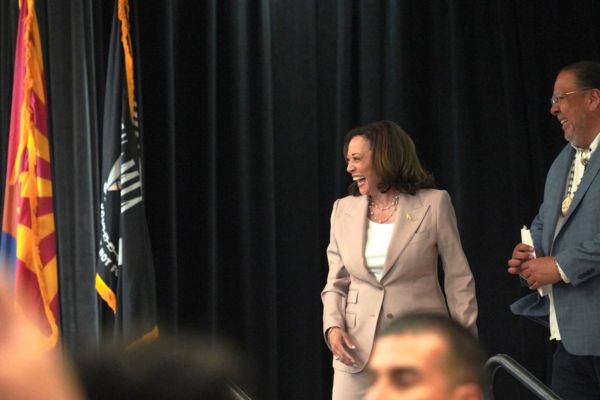
- Details
- By Darren Thompson
LAVEEN, AZ—On Thursday, the Gila River Indian Community (GRIC) hosted Vice President Kamala Harris’s first visit to Indian Country at the Gila Crossing Indian School.
It was Harris’s first to Indian Country as the Vice President and the first by a sitting Vice President in United States history.
“Representation matters,” said Junior Miss Gila River Sinica Sunflower Jackson, who was one of the people introducing Harris. “I have the privilege of welcoming one of my role models to the community.”
U.S. Assistant Secretary of Interior Bryan Newland and GRIC Governor Stephen Lewis also introduced the Vice President, touting the historic investments to Indian Country made by the Biden-Harris Administration.
In his introductions, Newland said that the Biden-Harris Administration has invested more than $45 billion since the beginning of the administration in 2021. Newland said that the amount invested by the administration comprises 15 years of funding for the Bureau of Indian Affairs, the federal agency he oversees.
“This administration has taken partnership to a whole new level, bringing Tribes generally to the table and working with us on important business,” said Lewis in his introduction. “Here in the community, I can easily point to our successful partnership. From federal funding to new investments in buildings like this one, this school, with more to come.”
Harris took the stage and announced the administration’s commitment to strengthening tribal sovereignty and self-determination. She said that the relationship between the federal government and Tribal Nations is sacred and acknowledged the contributions of American Indian people in the country’s armed forces.
“President Joe Biden and I believe that the bonds between our nations are sacred,” she said. “We believe we have a duty to safeguard those bonds, to honor tribal sovereignty and to ensure Tribal self-determination.”
In an effort to address disparities that exist across Indian Country, the Vice President spoke on historic investments made by the administration, including more than $500 million in tribal entrepreneurship and small businesses in tribal communities.
“Disparities are a result of centuries of broken treaties, harmful assimilation policies, displacement, dispossession and violence,” Harris said.
She also spoke of investments in Tribal communities to support fund Native-led climate resiliency efforts.
“That is why we are investing billions of dollars to help fund Native-led—not Native-consulted — climate resiliency efforts,” Harris said.
Earlier this year, the Biden-Harris administration announced that the Gila River Indian Community would be receiving $83 million from the Bipartisan Infrastructure Act for a pipeline that would move water from the reservation to its Pima-Maricopa Irrigation Project Facility. Officials have said that the project will help conserve an additional 20,000 acre-feet of water from the Colorado River. Harris visited the project location after her visit to the community school.
Harris also spoke of the recent Supreme Court decision that upheld the Indian Child Welfare Act, sharing her former experience working as an attorney for the San Francisco District Attorney’s Office and the Attorney General of the state of California. She advised the community to be vigilant because attacks on tribal sovereignty will continue.
“We are building a better future for this generation and the next seven generations to come,” Harris said.
Since taking office, the Biden-Harris Administration has worked closely with Tribal leaders and relaunched the White House Tribal Nations Summit, which was initially launched during the Obama Administration and ceased during the Trump Administration.
A crowd of more than 800 people attended Harris’s scheduled visit, including leaders from all 22 Arizona based Tribes, with presentations by local youth dignitaries, including Jr. Miss Gila River Sineca Sunflower Jackson and Miss Gila River Lehua Lani Dosela, who sang the National Anthem in the O’odham language. A cultural display of song and dance was demonstrated by the Maricopa Bird Singers and a youth group from the Gila River Indian Community.
Robert Miguel, Ak-Chin Indian Community's Tribal Chairman, said the event was “wonderful” to Native News Online. “I’m really glad we were invited to witness this,” he said.
More Stories Like This
Native News Weekly (August 25, 2024): D.C. BriefsNavajo Nation Mourns the Passing of Former Vice President Rex Lee Jim
Deb Haaland Earns Endorsement From Communications Workers of America Local 7076
University Soccer Standout Leads by Example
Two Native Americans Named to Democratic Congressional Campaign Committee's“Red to Blue” Program
Help us defend tribal sovereignty.
At Native News Online, our mission is rooted in telling the stories that strengthen sovereignty and uplift Indigenous voices — not just at year’s end, but every single day.
Because of your generosity last year, we were able to keep our reporters on the ground in tribal communities, at national gatherings and in the halls of Congress — covering the issues that matter most to Indian Country: sovereignty, culture, education, health and economic opportunity.
That support sustained us through a tough year in 2025. Now, as we look to the year ahead, we need your help right now to ensure warrior journalism remains strong — reporting that defends tribal sovereignty, amplifies Native truth, and holds power accountable.
 The stakes couldn't be higher. Your support keeps Native voices heard, Native stories told and Native sovereignty defended.
The stakes couldn't be higher. Your support keeps Native voices heard, Native stories told and Native sovereignty defended.
Stand with Warrior Journalism today.
Levi Rickert (Potawatomi), Editor & Publisher

